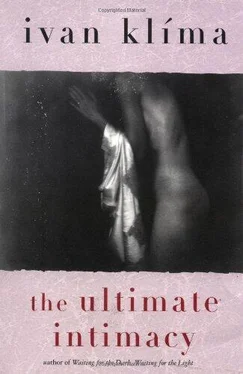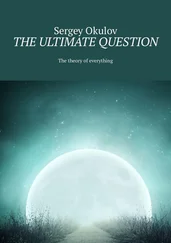Ivan Klima - The Ultimate Intimacy
Здесь есть возможность читать онлайн «Ivan Klima - The Ultimate Intimacy» весь текст электронной книги совершенно бесплатно (целиком полную версию без сокращений). В некоторых случаях можно слушать аудио, скачать через торрент в формате fb2 и присутствует краткое содержание. Год выпуска: 1998, Издательство: Grove Press, Жанр: Современная проза, на английском языке. Описание произведения, (предисловие) а так же отзывы посетителей доступны на портале библиотеки ЛибКат.
- Название:The Ultimate Intimacy
- Автор:
- Издательство:Grove Press
- Жанр:
- Год:1998
- ISBN:нет данных
- Рейтинг книги:3 / 5. Голосов: 1
-
Избранное:Добавить в избранное
- Отзывы:
-
Ваша оценка:
- 60
- 1
- 2
- 3
- 4
- 5
The Ultimate Intimacy: краткое содержание, описание и аннотация
Предлагаем к чтению аннотацию, описание, краткое содержание или предисловие (зависит от того, что написал сам автор книги «The Ultimate Intimacy»). Если вы не нашли необходимую информацию о книге — напишите в комментариях, мы постараемся отыскать её.
The Ultimate Intimacy — читать онлайн бесплатно полную книгу (весь текст) целиком
Ниже представлен текст книги, разбитый по страницам. Система сохранения места последней прочитанной страницы, позволяет с удобством читать онлайн бесплатно книгу «The Ultimate Intimacy», без необходимости каждый раз заново искать на чём Вы остановились. Поставьте закладку, и сможете в любой момент перейти на страницу, на которой закончили чтение.
Интервал:
Закладка:
As Bára and her son make their way back, their route takes them through a market where exotic birds are being sold. Saša enthuses over the rich colours of the Amazonian parrots, as well as the toucan and the cockatoo's golden coronet. They could buy one of them and take
it home. His stepfather could get himself a coronet too, so everyone could see he's the chief. And Aleš would be sure to love a parrot.
'You're crazy,' Bára tells him. 'We'll bring home a parrot and it'll split on me when it overhears me telling someone on the phone that I love him.'
Before they go for their dinner, Bára calls Sam from the hotel. As soon as she picks up the receiver it emits a long and, to her ears, plaintive tone, but she finds precise instructions alongside the telephone and she manages to dial the Prague number.
Samuel answers, which means he's alive and has survived her rebellion. Bára informs him that they have arrived safely and that it is lovely there. Its a pity he didn't come, she tells him, the Gaudi is unforgettable and Saša feels better.
Samuel remains silent, so she asks him how he is, but he continues to say nothing. The telephone is dead, maybe they have been cut off or Samuel has hung up.
So Bára calls again, but this time nobody answers the phone at the other end. Samuel refuses to talk to a wife who has disobeyed him.
It is humiliating. Bára feels as if she has proffered her hand to someone who has refused to shake it and she is aware of her blind submissiveness. She called Samuel instead of calling Daniel and telling him she loves him. So she dials another number. The telephone rings for a long time and then at last a girl's voice answers at the other end. Bára asks Magda if her daddy is at home.
'He's leading a Bible study class,' and Magda wants to know if she is to give Daddy a message.
It is evening and they go out once more into the street. They find a restaurant offering Catalan food and wines at reasonable prices. The waiter chooses them a table by the window. It is a table for five but there are no places taken so far. In her newly learnt Spanish, Bára orders three kinds of fish for herself and rabbit in an olive sauce with rice for Saša. She orders herself some red wine and orange juice for Saša who refuses wine.
Saša tries to entertain his mother by reading out suggestions for excursions to her from the guidebook: gothic bridges and castles, a Roman fortress, poetically foreign-sounding names like Sant Pol de Mar, Castelló d'Empuries, Torroela de Montgrí, Vendrell — Casals' birthplace. And the Pyrenees are not far away either.
'Listen, darling,' Bára interrupts him, 'we're only here for six days
and we can't see everything, and I'm not going mountain-climbing — you know I've ruined my lungs with smoking.'
Saša leafs through the phrase book for a moment and then announces 'Puesyo me he quedado con algo de hambre. Pediré algo más.' Bára asks him if an ice-cream sundae would suffice and she realizes with emotion that this is the first time she has been with her son acting as a chaperone and companion, that for the first and maybe last time she is sharing something special with him alone. She would like to hug him, her little boy, and say: Forgive me, I've bungled so many things in my life, but she simply says: 'Have a giant sundae or whatever you fancy'
Before bringing the ice-cream and another glass of wine for Bára, the waiter grumbles that the place is very full this evening and asks politely if he may sit a customer at their table.
Bára agrees — they'll be leaving shortly anyway — so the waiter brings the customer over. It's a man, although he looks more like a black-haired demon, if one accepts that demons can be as handsome in their fallen state as the angels they once were. The man has a large devilish nose, long, dark Arabic hair, a high forehead like Bara's, eyes even darker than hers and broad kissable lips. He is dressed entirely in black apart from his snow-white shirt. He bows and excuses himself in Spanish, telling her his name, the only bit of which Bára manages to understand is the Christian name, which she takes to be Anselmo, although she can't be sure. So Bára introduces herself too and she admits that Saša is her son.
Saša eyes the fellow with distrust and obvious displeasure. He wants to be alone with his mother and so he tells her he needn't wait for the ice-cream. But Bára has already ordered it and she doesn't feel they need to rush off anywhere. It's nice here, after all.
On hearing this strange tongue, the demon Anselmo asks in English where they are from and Bára tells him, 'From Prague.'
'Oh, Praga, Praga,' the man says. He was in Prague five years ago and saw the paintings from Picasso's classical period in the gallery there. Does she like Picasso?
Bára says she has had little opportunity to see the originals of his pictures.
So she must not miss the opportunity to see a collection of paintings by the young Picasso, because without that it is impossible to understand his genius. A man who at the age of fourteen had mastered
technique to the extent of painting like Leonardo or Van Dyck could not help overthrowing the old forms and conventions and going on looking for newer and newer forms of expression.
Bára replies that they would be sure to visit the museum as they were here for another six days.
If she permitted he would be happy to act as her guide, the man offers. It would be a pleasure to guide a beautiful woman from Prague and her son.
Bára smiles at him and leaves his offer unanswered, while Saša scowls. He bolts his ice-cream, but the demon has already ordered Bára another glass of wine.
Don Anselmo slowly eats his scampi while talking softly in an alluring voice. He talks about Picasso and Dali, whom he loves and admires as a unique giant among artists and the most remarkable, albeit extreme, genius. He had spoken to him on several occasions, as he had once written a major study of him. He regrets that the lady from Prague does not have enough Spanish, but will gladly make her a gift of a copy. Art history is the demons field of study and Dali is his speciality. If Bára is staying longer he will gladly drive her to Figueras and show her the masters birthplace.
'Bára dear,' her son rebukes her, 'we ought to go.'
But Bára has no wish to. She is sipping heavy wine that has the scent of muscatel and Catalan sunshine, and watching the man opposite, no longer particularly aware of what he is saying, but being conscious only of the melody of his voice and the message of his gaze, which unlike his mouth professes admiration, requests an assignation, demands her embrace, and in fact slowly undresses her and fondles her breasts. And she realizes that she is free, totally free. No one is watching over her, she can do just what she likes; she can delight in the fact that she is attractive to a man she finds so alluring that merely looking at him gives her physical pleasure.
Then she listens to a story about how Dali kissed the teeth of a dying horse when he was small and then when he was five he hurled an even smaller boy from a bridge. She doesn't know whether it actually happened, or whether they are only empty words to fill the time that must elapse between first acquaintance and making love.
Saša once more presses her to leave with him, and she suggests that he should go on ahead to the hotel if he is tired, that she'll join him shortly. But this her son refuses.
She realizes that Saša has decided to keep an eye on her, but she does not feel it as a curb on her freedom; she is grateful to him, to her little boy, for not abandoning her and not leaving her to the mercy of the demon and her own urges.
'Just one more glass,' she tells her son and allows herself to be soothed once again by the sweetly insistent voice that now speaks of love, Dali's of course — for his Gala, who was matchless, loyal and inspirational.
Читать дальшеИнтервал:
Закладка:
Похожие книги на «The Ultimate Intimacy»
Представляем Вашему вниманию похожие книги на «The Ultimate Intimacy» списком для выбора. Мы отобрали схожую по названию и смыслу литературу в надежде предоставить читателям больше вариантов отыскать новые, интересные, ещё непрочитанные произведения.
Обсуждение, отзывы о книге «The Ultimate Intimacy» и просто собственные мнения читателей. Оставьте ваши комментарии, напишите, что Вы думаете о произведении, его смысле или главных героях. Укажите что конкретно понравилось, а что нет, и почему Вы так считаете.






![Theresa Cheung - The Dream Dictionary from A to Z [Revised edition] - The Ultimate A–Z to Interpret the Secrets of Your Dreams](/books/692092/theresa-cheung-the-dream-dictionary-from-a-to-z-r-thumb.webp)





